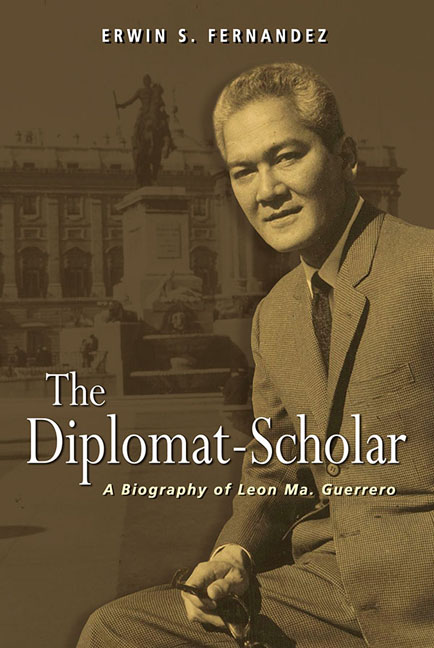Book contents
- Frontmatter
- Dedication
- Contents
- Preface
- Prologue
- Chronology
- I Ermita and Santa Cruz to Intramuros: Between Literary and Legal Career
- 1 Bourgeois Ermita: Birth and Boyhood
- 2 Education under American Jesuits
- 3 The Humorist as Critic, Writer and Actor
- 4 Juggling Law and Journalism on the Eve of War
- II To Tokyo and Back: The Making of a Diplomat
- III Going In, then Out of the Political Jungle: Padre Burgos to Arlegui
- IV London and Madrid: The Philippines in a Resurgent Asia
- V New Delhi to Belgrade: The Philippines towards Non-Alignment
- Epilogue
- Glossary
- List of Abbreviations
- Bibliography
- Index
- About the Author
4 - Juggling Law and Journalism on the Eve of War
from I - Ermita and Santa Cruz to Intramuros: Between Literary and Legal Career
Published online by Cambridge University Press: 12 January 2018
- Frontmatter
- Dedication
- Contents
- Preface
- Prologue
- Chronology
- I Ermita and Santa Cruz to Intramuros: Between Literary and Legal Career
- 1 Bourgeois Ermita: Birth and Boyhood
- 2 Education under American Jesuits
- 3 The Humorist as Critic, Writer and Actor
- 4 Juggling Law and Journalism on the Eve of War
- II To Tokyo and Back: The Making of a Diplomat
- III Going In, then Out of the Political Jungle: Padre Burgos to Arlegui
- IV London and Madrid: The Philippines in a Resurgent Asia
- V New Delhi to Belgrade: The Philippines towards Non-Alignment
- Epilogue
- Glossary
- List of Abbreviations
- Bibliography
- Index
- About the Author
Summary
In the summer of 1935, Leoni decided to work as a staff member of the Free Press. His work was interrupted in April when his grandfather died. As a tribute to Don León, he wrote a personal essay published in the Free Press. In the necrological rites held three months later, he represented the family and expressed gratitude for the honour accorded to his grandfather. A scholarship opportunity shaped in part his decision to take up law at Philippine Law School (PLS) in June at Calle Bustillos in Sampaloc — he would be a full scholar. He was not the first in the family to take up law — two of his uncles, Fernando María and Cesar María, were lawyers. That he had become enamoured of the legal profession was shown by a short story, “An Enemy of Caesar”, he wrote in April.
Before classes started in June, he went to Japan as a tourist and came out with several articles about his trip, which happened after the Sakdal uprising in early May. He reported on how the Japanese treated Benigno Ramos, the exiled leader of the Sakdals, whom many Japanese considered as “the great liberator” of the Philippines. One article told about their stay in Japan: the first week was spent in a hotel that was no different in Manila and the second week in Fukidecho where he and his companions were able to experience Japanese hospitality, taste sashimi, sleep on the floor and take a shower in a public bath. Another article warned readers about a travel racket to Japan run by a crook who would make a big profit out of the credulous tourist.
Having enrolled in night classes, Leoni worked during the day in the Free Press with offices at Avenida Rizal in Santa Cruz. The editorial office occupied half of the third floor that had at its centre its founder and publisher Robert McColluch Dick's desk. Behind it was the associate editor's and behind each post sat the staff writers. Behind one of these desks was Leoni with his foot up on his chair and a pipe in his mouth.
- Type
- Chapter
- Information
- The Diplomat-ScholarA Biography of Leon Ma. Guerrero, pp. 48 - 64Publisher: ISEAS–Yusof Ishak InstitutePrint publication year: 2017

